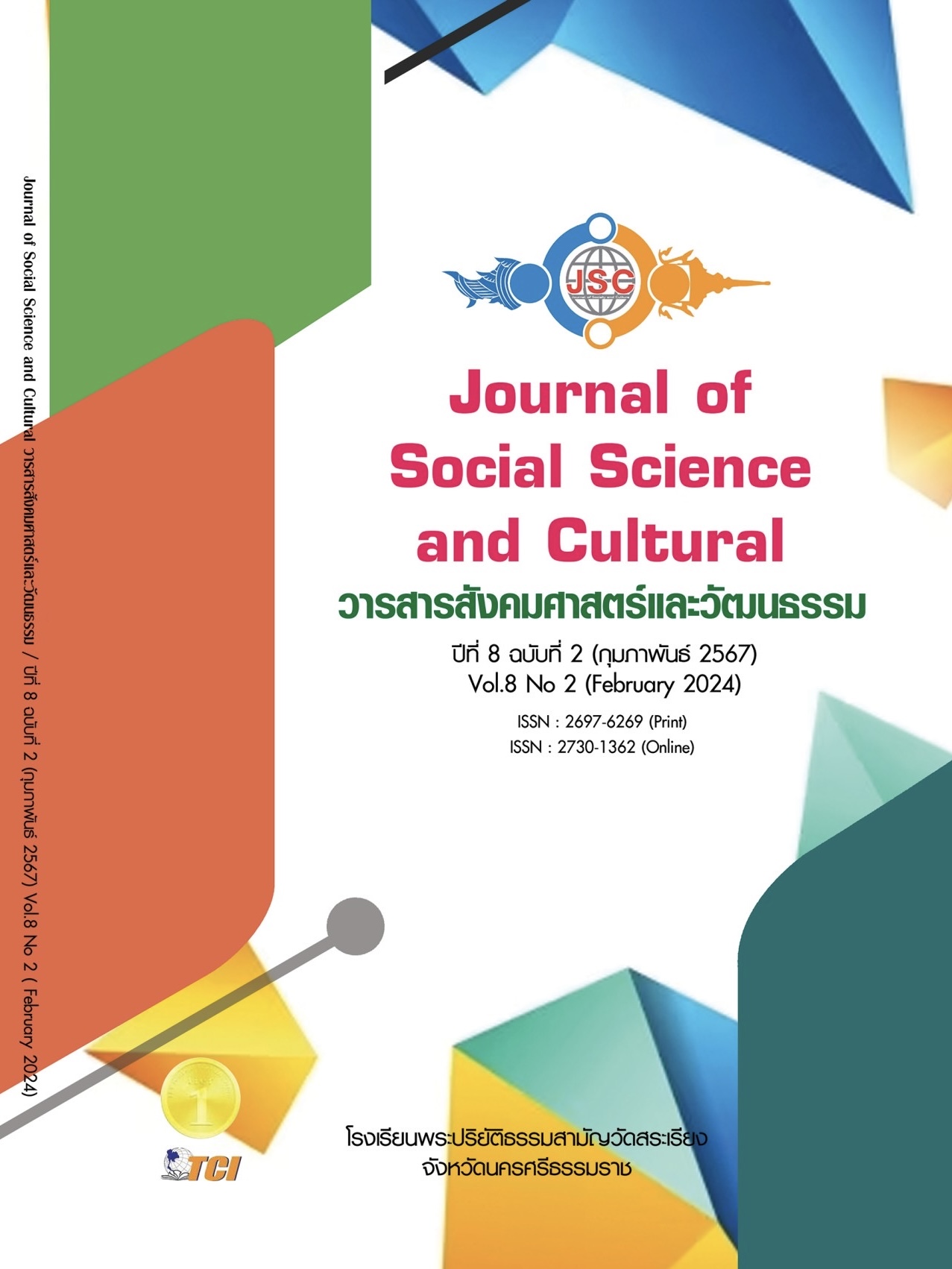ENHANCEMENT OF SERVICE INNOVATION IN HOTEL BUSINESS BASED ON CULTURAL HERITAGE IN PHRA NAKHON SI AYUTTHAYA PROVINCE
Main Article Content
Abstract
This research addresses the following three principal objectives: 1) to survey the management behaviors of service innovation in the hotel business in Phra Nakhon Si Ayutthaya 2) to analysis the potential of service innovation based on cultural heritage in Phra Nakhon Si Ayutthaya 3) to design guidelines for enhancing the level of service innovation in the hotel business based on cultural heritage in Phra Nakhon Si Ayutthaya. All by considering the case of Ayutthaya province. On this premise, the experiment has been conducted by applying both qualitative and quantitative methods. By using the former method, thirty (30) expert’s interviews were designed and conducted from representative groups that included, among others, in-depth interviews with selected academic scholars and entrepreneurs. For the latter part, quantitative analysis was instead conducted by using data analysis based on data collection from the statistical population of four hundreds and nine (409) from Thai and foreigner tourist segments. The analysis was then performed by using averaging values and standard deviations. Three principal outcomes can be synthesized from the experiment. First, values from the service innovation can be realized by applying technology in experience design, particularly in consideration of cultural heritage for both products and services. Second, there are, according to the experiment, two most important categories that influence the experimental results: product design and process innovation, with both factors grounded on the premise of cultural heritage. Third and last, there are four (4) most important types of innovation (“4RES MODE”) that stand out from the experiment, which are, Relation Service Innovation ,Remembrance Service Innovation ,Regional culture Service Innovation ,Relaxing Service Innovation— that altogether play critically important roles in advancing innovative service potentials, and improving corresponding service management there of as intended
Article Details
References
โสรยา สุภาผล และลัดดาวัลย์ สำราญ. (2564). ปัจจัยภาพลักษณ์องค์กรและปัจจัยการบริหารลูกค้าสัมพันธ์ที่ส่งผลต่อความจงรักภักดีของสมาชิกสหกรณ์การเกษตรแห่งหนึ่งในจังหวัดสุพรรณบุรี. วารสารมหาวิทยาลัยราชภัฏธนบุรี, 16(1), 103-118.
กระทรวงการท่องเที่ยวและกีฬา. (2565). สถานการณ์การท่องเที่ยวในประเทศ รายจังหวัด ปี 2565 (Domestic Tourism Statistics Classify by region and province 2023). เรียกใช้เมื่อ 20 มิถุนายน 2565 จาก https://mots.go.th/news/category/657
ชฎิล มาตรา. (2562). นวัตกรรมการบริการของโรงแรมเพื่อรองรับนักท่องเที่ยวผู้สูงอายุที่มาพักแรมในจังหวัด ขอนแก่น. ใน รายงานการวิจัย. มหาวิทยาลัยศรีปทุม.
ญาณิพัชญ์ อาภรณ์แสงวิจิตร. (2561). ปัจจัยที่มีผลต่อการตัดสินใจเดินทางท่องเที่ยวคนเดียวของ สตรี(Solo Female Travel) ในเขตกรุงเทพมหานครและเขตปริมณฑล. ใน การค้นคว้า อิสระปริญญามหาบัณฑิต. มหาวิทยาลัยธรรมศาสตร์.
ณภัทร ญาโนภาส. (2561). นวัตกรรมการท่องเที่ยวยุคดิจิทัล. วารสารวิชาการมหาวิทยาลัยราชภัฏ กาญจนบุรี, 7(2), 148-157.
ดาวรุ่ง ฟักทองและคณะ. (2565). การสร้างความทรงจำด้วยการจัดการภูมิทัศน์ประสบการณ์สำหรับธุรกิจโรงแรม. University of the Thai Chamber of Commerce Journal Humanities and Social Sciences, 42(4), 171-189.
ดาวศุกร์ บุญญะศานต์ และชงค์สุดา โตท่าโรง. (2563). นวัตกรรมการบริการกับการสร้างคุณค่าในธุรกิจโรงแรม. วารสารมนุษยศาสตร์และสังคมศาสตร์ นายเรืออากาศ, 8(1), 68 -70.
ตรีธวัฒน์ มีสมศักดิ์. (2566). การปรับตัวในการจัดงานอีเวนต์เชิงวัฒนธรรมหลังสถานการณ์โรคระบาคโควิด-19 กรณีศึกษา: กิจกรรมงานรําลึกสมเด็จพระนเรศวรมหาราช จังหวัดพระนครศรีอยุธยา. วารสาร มนุษยศาสตร์และสังคมศาสตร์ มหาวิทยาลัยราชภัฏบ้านสมเด็จเจ้าพระยา, 17(1), 245-266.
ถนอมศิลป์ จันคณากิติกุลและนิศารัตน์ โชติเชย. (2565). รูปแบบความสัมพันธ์โครงสร้างเชิงสาเหตุของปัจจัย ที่ส่งผลต่อความได้เปรียบในการแข่งขันเพื่อความสำเร็จอย่างยั่งยืนของธุรกิจโรงแรมในกลุ่มจังหวัดภาค ตะวันออกเฉียงเหนือตอนบน 1. วารสารสันติศึกษาปริทรรศน์ มจร, 10(7), 2961-2975.
นัธฐ์ นัชชาสินเจริญเอกและวีระ วีระโสภณ. (2566). ปัจจัยที่ส่งผลต่อพฤติกรรมและความพึงพอใจของ นักท่องเที่ยวย่านเยาวราช. ใน รายงานการประชุม Graduate School Conference (หน้า (Vol. 5, No. 1, pp. 483-490)). มหาวิทยาลัยราชภัฎสวนสุนันทา.
วีรวัลย์ ปิ่นชุมพลแสง และกอบกูล จันทรโคลิกา. (2561). การศึกษาปัจจัยการตัดสินใจเลือกเข้าพักโรงแรม และรีสอร์ทของประเทศไทยตามแนวชายฝั่งทะเลอ่าวไทยตะวันตก. RMUTT Global Business and Economics Review, 13(2), 35-50.
วีระพน ภานุรักษ์. (2559). การพัฒนาระบบสารสนเทศที่ส่งเสริมการยอมรับเทคโนโลยีตามแบบจำลอง TAM เพื่อการวิจัยและบริการวิชาการ คณะเทคโนโลยีสารสนเทศ มหาวิทยาลัยราชภัฏมหาสารคาม. วารสารโครงงานวิทยาการคอมพิวเตอร์และเทคโนโลยีสารสนเทศ, 4(2), 17-26.
สำนักงานสถิติจังหวัดพระนครศรีอยุธยา. (2566). รายงานสถิติจังหวัดพระนครศรีอยุธยา พ.ศ. 2566 (อินเตอร์เน็ต). เรียกใช้เมื่อ 2 มกราคม 2566 จาก https://anyflip.com/cikge/rrgb
อริยา พงษ์พานิชและฉลองศรี พิมลสมพงศ์. (2563). การพัฒนาการออกแบบอารยบริการสำหรับ นักท่องเที่ยว สูงอายุในแผนกงานหลักของที่พักแรม. วารสารสันติศึกษาปริทรรศน์ มจร, 8(6), 2283-2298.
Boo, S., & Busser, J. A. (2018). Tourists’ hotel event experience and satisfaction: an integrative approach. Journal of Travel & Tourism Marketing, 35(7), 895-908.
Brown. (1999). Retro-marketing: yesterday’s tomorrows. today! Marketing Intelligence & Planning, 17(7), 363-376. doi: doi:10.1108/02634509910301098.
Bunrangsee, P., & Pasunon, P. (2018). Factors affecting hotel selection of Thai tourists In Bangkok. Journal of Humanities and Social Sciences Thonburi University, 12(29), 193-205.
Chathoth, P. K. (2007). The impact of information technology on hotel operations, service management and transaction costs: A conceptual framework for full-service hotel firms. International Journal of Hospitality Management, 26(2), 395-408.
Damanpour, F. (1996). Organizational Complexity and Innovation Developing and Testing Multiple Contingency Models. Management Science, 42(1996), 693-716.
Delbecq, A. L. et al. (1975). Group techniques for program Planning: A guide to nominal group and Delphi processes. Glenview, IL: Scott, Foresman and Company.
Hjalager, A. M. (2010). A review of innovation research in tourism. Tourism management, 31(1), 1-12.
Lee, P. et al. (2020). Smart tourism city: Development and transformations. Sustainability, 12, 3958; doi:10.3390/su12103958.
Marques, I. A. et al. (2022). Hotel Technology Innovations as Drivers of Safety and Hygiene in Hotel Customers In Advances in Tourism, Technology and Systems: Selected Papers from ICOTTS 2021, Volume 2 (pp. 571-583). Singapore: Springer Nature Singapore.
Park H, Lee., et al. (2023). National trends in sleep sufficiency and sleep time among adolescents, including the late-COVID-19 pandemic, 2009-2022: A nationally representative serial study in South Korea. Asian Journal of Psychiatry, 93(2023), 103911.
Pine, B. J. et al. (1999). The experience economy: Work is theatre & every business a stage. Boston, MA: Harvard Business Press.
Rajagukguk., et al. (2023). Oxidativestability assessment of industrial and laboratory-pressed fresh raspberry seed oil. Food Chemistry Advances, 2(2023), 100186.
Shiwen, L. et al. (2022). Self-service technology in the hospitality and tourism settings: a critical review of the literature. Journal of Hospitality & Tourism Research, 46(6), 1220-1236.
Tohmo, T. (2018). The economic impact of tourism in Central Finland: a regional input–outputstudy. Tourism Review, 73(4), 521-547.
Tubtimcharoon, N. (2018). THE POTENTIAL DEVELOPMENT OF THE BUSINESS OF SMALL HOTELS IN DIGITAL ECONOMY AGE IN THAILAND. Sripatum Review of Humanities and Social Sciences, 18(2), 42-54.
Vargo, S. L. et al. (2015). Innovation through institutionalization: A service ecosystems perspective. Industrial Marketing Management, 44(2015), 63-72.
Verma., et al. (2008). Current and future status of herbal medicine. Veterinary World, 2(2), 347.
Wolfe, R.A. (1994). ‘Organizational innovation: review, critique and suggested research directions’. Journal of Management Studies, 31(3), 405-431.
Zhanjing Zeng., et al. (2020). From high-touch to high-tech: COVID-19 drives robotics adoption. Tourism Geographies, 22(1), 1-11.


